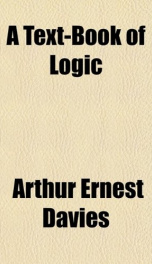a text book of logic

Purchase of this book includes free trial access to www.million-books.com where you can read more than a million books for free. This is an OCR edition with typos. Excerpt from book: sciousness, but whether the images and ideas that we entertain are true, that is, afford us accurate knowledge of the objects which they represent and to which they point. Or, to put it more succinctly, logic studies the conditions of the truth or falsity of our ideas, a problem which, for psychology, is quite indifferent or non-existent. Logic as an Art. It is sometimes said that logic is an art as well as a science. The meaning of this statement can be made clear, if we bear in mind that the term 'art' is used in two senses. In the first and most common meaning, it refers to the developed skill that one acquires through practice of a set of more or less mechanised movements. If, for example, you go into a machine shop and watch the workmen at their tasks, you will find them engaged in different activities, and displaying varying degrees of skill. It is this ability to do a given task with some degree of proficiency that we call the workman's art. Art is, then, a specialised ability to do. On the other hand, there is an ability, much more specialised than the mechanic's, which consists in the perception of how a task should be done, but which does not necessarily carry with it an ability to perform it. The engineer, for example, is able to plan and superintend building enterprises, although he does not have the ability of the workmen upon whom he must rely if these enterprises are to be translated into steel and brick and stone. The skilled workman and the engineer display two different orders of practical ability, and we mayspeak of each one of them as possessing and practicing an art. Now, when logic is spoken of as an art, it is well to be clear whether we are using the term art in the first or in the second of the two meanings just distinguished; whether we are thinking...
Info about the book
Author:
Series:
Unknown
ASIN:
B006M5GQ8W
Rating:
3.5/5 (4)Your rating:
0/5
Languge:
English
Users who have this book
Users who want this book
What readers are saying
What do you think? Write your own comment on this book!
write a commentif you like a text book of logic try:
Other books by this author
Do you want to read a book that interests you? It’s EASY!
Create an account and send a request for reading to other users on the Webpage of the book!

